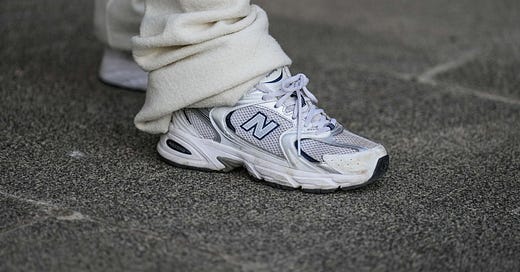New Balance Is Being Sued For It's "Made in America" Claims
Here's why this is an important case to look into.

A lawsuit filed earlier this month named New Balance as the defendant in a case about deceptive marketing. The famous sneaker brand is being sued for using "Made in America" labels on its shoes and website even though parts of the manufacturing are done elsewhere. Plaintiffs Matthew Cristostomo, Anthony Bollini, Spencer Verrilla, Derrick Evans, Clifton Bradley, and Robert Kaminsky say New Balance is misrepresenting its product so that customers are paying a premium price for a product because of its U.S. manufacturing – even though that may not be the case. According to the lawsuit, some of the soles of the New Balance shoes are imported from China, and up to 30% of the products are manufactured outside the United States. (The filing does note that the brand establishes this "by including a small print disclaimer in small font in portions of its website and on the underside of its packaging," but goes on to say that it is not enough.
This is a problem, the suit claims, because "plaintiffs and members of the classes were injured by the price premium they paid for the sneakers due to [New Balance's] misrepresentation that the sneakers were made in the United States when they were not." Furthermore, the U.S. Federal Trade Commission (F.T.C.) rules say that to claim a product is American made, all or almost all parts need to be made in the U.S.
The premium price portion of this case is the most fascinating part to unpack from both a customer and brand perspective. Why is there a premium placed on an American-made product when the simple fact that it is made in the United States does not make it higher quality or without risk of sweatshop labor? This is not to say that U.S.A. based manufacturing can't be of excellent quality, but so can manufacturing anywhere else in the world. Is the myth of American superiority so marketable that we can very easily overlook everything else because of these assumptions? Probably.
This lawsuit comes at an interesting time because garment workers in Los Angeles won a significant victory against wage theft in factories just this year. Throughout the fight, hundreds of workers came forward to dispel the idea that American-made fashion is somehow better, and yet, still with the right messaging, people are willing to pay more for it. As a consumer, it's best not to look at the country as the only indication of quality, but instead check to see if a brand has its specific manufacturers listed on their website in an About section. You can see if those workers are unionized or if the factory has certifications and standards available to view. Transparency is valuable. When we allow brands to make claims (whether its about sustainability, ethics or anything else) without backing them up with actual facts about the supply chain, then we let them make money on words not practices.
While there has been no ruling on this case, according to Fashion Law the "F.T.C.'s new rules say that violations can come with "monetary penalties of up to $43,280 for each violation of the "Made in the U.S.A." standard."



